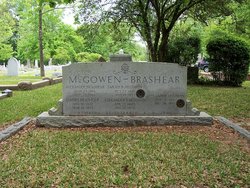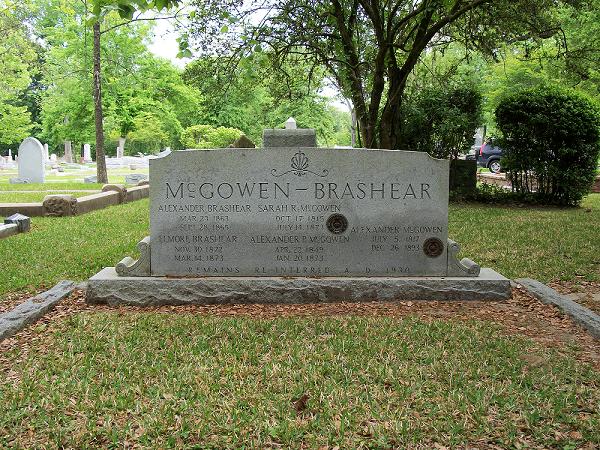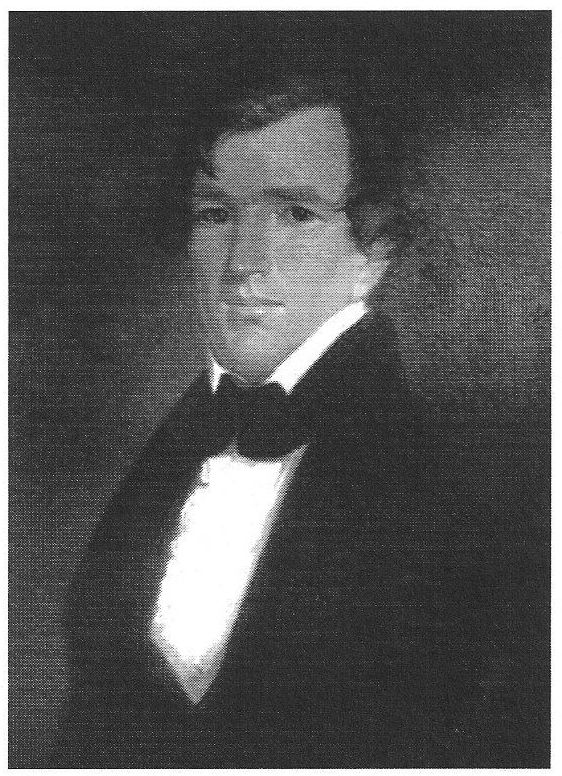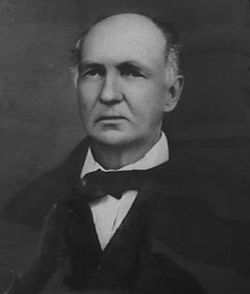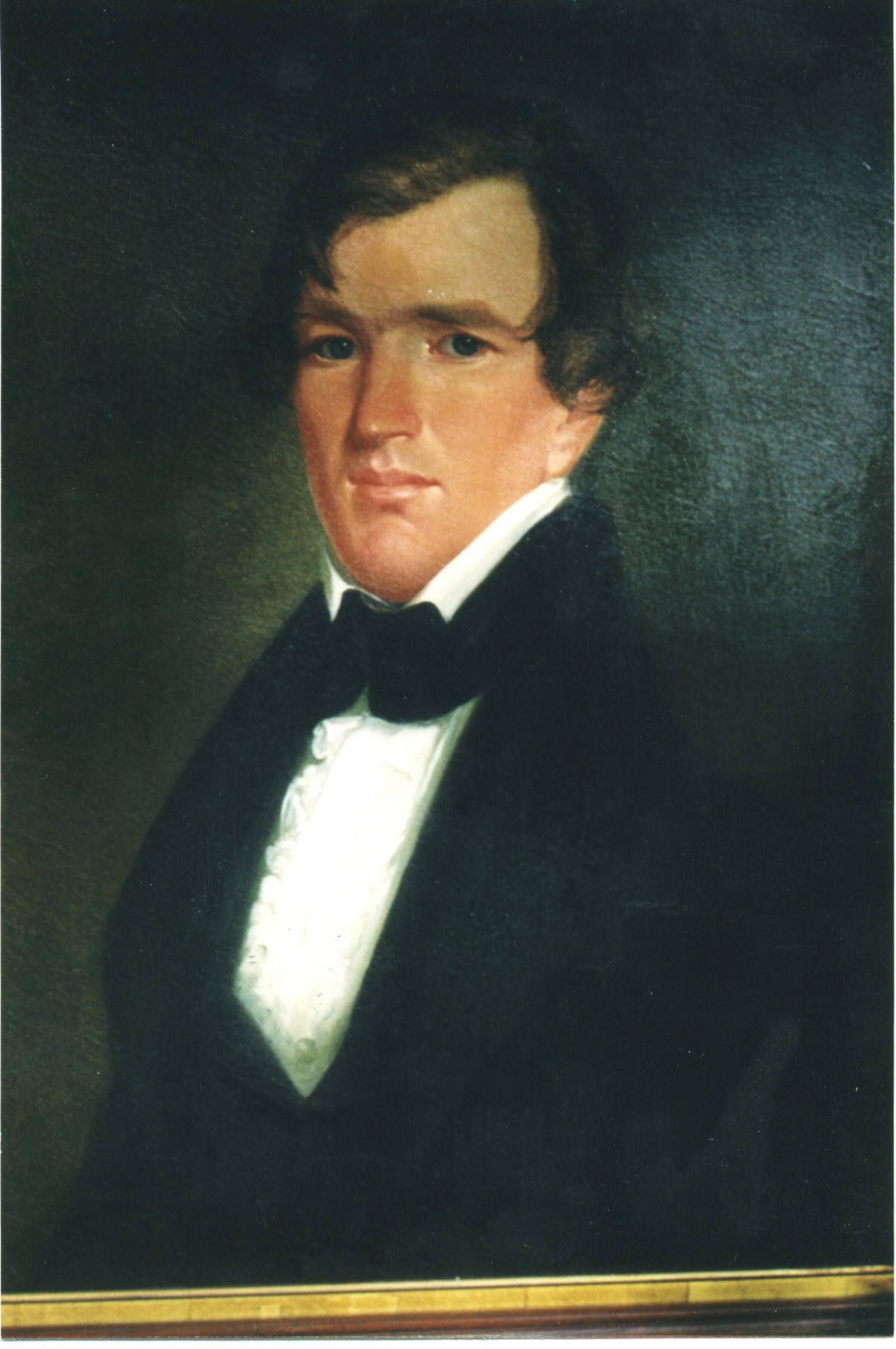~ ~ ~ ~
McGOWN, ALEXANDER
The subject of this memoir was a resident of the city of Houston from 1839 to 1S93, a period of fifty-four years. During the greater part of that time he was a prominent figure in the city's history, a well-known character in public affairs, and a man of wide personal popularity. Any record, therefore, of the old citizens of Harris county, which did not include a notice of him would be signally lacking in interest and completeness, and would to that extent clearly be a reflection on the discernment of the compiler.
Alexander McGowen was born in Duplin county. North Carolina, July 5, 1817. He was reared an orphan, his childhood, and youth being passed mainly in Montgomery Alabama, to which place his foster parents moved when he was young. His educational advantages were nothing to speak of, being in fact very limited; but he was taught a useful trade, that of a tinner, and equipped with this, and a good set of resolutions, reinforced by sober and industrious habits, he came to Texas in September, 1839, being then in his twenty-second year, and settled at Houston. Here he shortly afterward opened a small tinshop, and in this unpretentious way entered on his business career. He prospered with the growth of the place, his tinshop being succeeded by a hardware store, and this in time by a foundry. His foundry was one of the first, if not the first, ever started in Texas, and was no unimportant factor in the industrial development of the country. Mr. McGowen furnished the castings and heavy hardware, such as were in demand, to all the settlers from the up-country as far as Dallas, and Fort Worth, and west to San Antonio. He made the castings used by Gail Borden in the manufacture of his condensed-milk apparatus, and for all other purposes of this general nature. The business which he thus founded still continues in existence, being the one now conducted by his son, Edmond F., on Railroad street, near the junction of Buffalo and White Oak bayous. Mr. McGowen was connected with its management up to the time of his death, and took much interest in its success. But it was not for his connection with the business interests of this city that he will be longest remembered. It was rather on account of his career as a public official. Few men in this section of the State were evermore continuously in public life than Alexander McGowen, or poseessed in such an unqualified degree the confidence of the people. He was elected to the first State Constitutional convention, in 1845, defeating, in the election, David G. Burnet, ex-President of the Republic; he was three times Mayor of the city of Houston, besides being several times Alderman; was Chief Justice of Harris county; County Assessor, and for six years County Treasurer, holding this last office at the time of his death. An incumbent of so many offices at different times in life, he, of necessity, had much to do with the making of the history of his adopted State, and it can be recorded to his honor, that his influence and best efforts were always directed to what he believed to be for the best interests of the people among whom he lived, and whom he was thus called to serve. His efforts in behalf of education in the Constitutional convention of 1845 are especially worthy of mention, since there he helped to lay the foundation of the present splendid public-school system of Texas, thus giving practical meaning as well as the force of legal enactment to the wise saying that public knowledge is public virtue. Judge McGowen saw in the vast landed domain which Texas possessed the means of securing to every child in the State the benefits of an education, and he was a man of far too kind a heart and enlightened judgment to let such an opportunity pass. He espoused the cause of popular education in that convention, and the rights of the head of a family to reasonable exemptions as to homestead and personal property, and he worked without ceasing until the claims of each were protected, substantially as he conceived they should be, by the organic law of the State. As a judicial officer Judge McGowen discharged his duties with marked impartiality and a strict regard for the law. So upright was his character, and so just were his rulings, that it is said that a jury was rarely ever called for in his court, and still more rarely were cases ever taken up from his court on appeal. As Mayor, Alderman, Assessor, and Treasurer he always discharged his duties with strict regard to the public welfare, seeking to protect the interest of the individual taxpayer, while infusing into the public service, as far as consistent, a spirit of enterprise and general advancement. His honesty was beyond question and his liberality well known. He not only gave generously, for one of his means, but he was liberal in his opinions, his mind offering a warm hospitality to the thoughts of others. He was always willing to discuss differences in politics, religion, or social affairs, and, where he could, to learn from others. No stronger proof of the humanity that pervaded his nature could be offered than the fact that he stood at his post during every yellow-fever epidemic that ever visited the city of Houston, and at the peril of his own life ministered to the wants of his suffering fellowmen. His unselfish devotion to the people among whom he lived, and his uniform kindness and courtesy were among the great secrets of his popularity, and made the people rally to his support on every occasion when he asked their suffrage. In politics Judge McGowen was a lifelong Democrat, and he not only believed profoundly in the principles of his party, but he insisted on an observance of the established forms and methods by which those principles are put in force. It was not sufficient with him to be right on the "main question." He made loyalty to the constituted authorities of the party a test of soundness as well as devotion to principle. He took but little interest, on the other hand, in fraternity matters. He was a charter member of Lone Star Lodge, No. 1, Independent Order of Odd Fellows, of this city, and he kept up his membership in this lodge until its charter was forfeited by lapses. But when it was subsequently reorganized he did not identify himself with it. He joined the Methodist Church in this city, and, in connection with the late Judge Charles Shearn and the late T. W. House, he was for years one of the chief financial stays of this congregation. For twenty-five years before his death, he was a Trustee in this church, and took an active part in all church work.
Judge McGowen married Mrs. Sarah Christopher, of Houston, in 1841, and by this union had eight children, all of whom became grown, but only two of whom, a daughter, Mrs. Kate Brashear, and a son, Edmond F. McGowen, are now living. On the 14th day of July, 1873, Mrs. McGowen died, and, some two years after her death. Judge McGowen married Miss Florence Abbey, to which union one son was born, Walter McGowen.
Judge McGowen died on the 26th day of December, 1893, after a brief illness. News of his death fell with universal sorrow on the community in which he had so long lived, and every possible mark of respect was shown to his memory. The Commissioners' Court and the bar each passed appropriate resolutions, all the courts then in session in the city adjourned, and a large concourse of citizens attended his funeral and followed his remains to their last resting place at old San Felipe cemetery. In the formative era of a new State like Texas, it is hard to estimate the influence for good exerted by a man like Judge McGowen. First impulses last long, and when those impulses are given in the right direction they are the source of incalculable good. Of such an one it may be said with all truth and reverence, that, though dead, he yet liveth.
Source: History of Texas Biographical History of the Cities of Houston and Galveston (1895)
~ ~ ~ ~
McGOWN, ALEXANDER
The subject of this memoir was a resident of the city of Houston from 1839 to 1S93, a period of fifty-four years. During the greater part of that time he was a prominent figure in the city's history, a well-known character in public affairs, and a man of wide personal popularity. Any record, therefore, of the old citizens of Harris county, which did not include a notice of him would be signally lacking in interest and completeness, and would to that extent clearly be a reflection on the discernment of the compiler.
Alexander McGowen was born in Duplin county. North Carolina, July 5, 1817. He was reared an orphan, his childhood, and youth being passed mainly in Montgomery Alabama, to which place his foster parents moved when he was young. His educational advantages were nothing to speak of, being in fact very limited; but he was taught a useful trade, that of a tinner, and equipped with this, and a good set of resolutions, reinforced by sober and industrious habits, he came to Texas in September, 1839, being then in his twenty-second year, and settled at Houston. Here he shortly afterward opened a small tinshop, and in this unpretentious way entered on his business career. He prospered with the growth of the place, his tinshop being succeeded by a hardware store, and this in time by a foundry. His foundry was one of the first, if not the first, ever started in Texas, and was no unimportant factor in the industrial development of the country. Mr. McGowen furnished the castings and heavy hardware, such as were in demand, to all the settlers from the up-country as far as Dallas, and Fort Worth, and west to San Antonio. He made the castings used by Gail Borden in the manufacture of his condensed-milk apparatus, and for all other purposes of this general nature. The business which he thus founded still continues in existence, being the one now conducted by his son, Edmond F., on Railroad street, near the junction of Buffalo and White Oak bayous. Mr. McGowen was connected with its management up to the time of his death, and took much interest in its success. But it was not for his connection with the business interests of this city that he will be longest remembered. It was rather on account of his career as a public official. Few men in this section of the State were evermore continuously in public life than Alexander McGowen, or poseessed in such an unqualified degree the confidence of the people. He was elected to the first State Constitutional convention, in 1845, defeating, in the election, David G. Burnet, ex-President of the Republic; he was three times Mayor of the city of Houston, besides being several times Alderman; was Chief Justice of Harris county; County Assessor, and for six years County Treasurer, holding this last office at the time of his death. An incumbent of so many offices at different times in life, he, of necessity, had much to do with the making of the history of his adopted State, and it can be recorded to his honor, that his influence and best efforts were always directed to what he believed to be for the best interests of the people among whom he lived, and whom he was thus called to serve. His efforts in behalf of education in the Constitutional convention of 1845 are especially worthy of mention, since there he helped to lay the foundation of the present splendid public-school system of Texas, thus giving practical meaning as well as the force of legal enactment to the wise saying that public knowledge is public virtue. Judge McGowen saw in the vast landed domain which Texas possessed the means of securing to every child in the State the benefits of an education, and he was a man of far too kind a heart and enlightened judgment to let such an opportunity pass. He espoused the cause of popular education in that convention, and the rights of the head of a family to reasonable exemptions as to homestead and personal property, and he worked without ceasing until the claims of each were protected, substantially as he conceived they should be, by the organic law of the State. As a judicial officer Judge McGowen discharged his duties with marked impartiality and a strict regard for the law. So upright was his character, and so just were his rulings, that it is said that a jury was rarely ever called for in his court, and still more rarely were cases ever taken up from his court on appeal. As Mayor, Alderman, Assessor, and Treasurer he always discharged his duties with strict regard to the public welfare, seeking to protect the interest of the individual taxpayer, while infusing into the public service, as far as consistent, a spirit of enterprise and general advancement. His honesty was beyond question and his liberality well known. He not only gave generously, for one of his means, but he was liberal in his opinions, his mind offering a warm hospitality to the thoughts of others. He was always willing to discuss differences in politics, religion, or social affairs, and, where he could, to learn from others. No stronger proof of the humanity that pervaded his nature could be offered than the fact that he stood at his post during every yellow-fever epidemic that ever visited the city of Houston, and at the peril of his own life ministered to the wants of his suffering fellowmen. His unselfish devotion to the people among whom he lived, and his uniform kindness and courtesy were among the great secrets of his popularity, and made the people rally to his support on every occasion when he asked their suffrage. In politics Judge McGowen was a lifelong Democrat, and he not only believed profoundly in the principles of his party, but he insisted on an observance of the established forms and methods by which those principles are put in force. It was not sufficient with him to be right on the "main question." He made loyalty to the constituted authorities of the party a test of soundness as well as devotion to principle. He took but little interest, on the other hand, in fraternity matters. He was a charter member of Lone Star Lodge, No. 1, Independent Order of Odd Fellows, of this city, and he kept up his membership in this lodge until its charter was forfeited by lapses. But when it was subsequently reorganized he did not identify himself with it. He joined the Methodist Church in this city, and, in connection with the late Judge Charles Shearn and the late T. W. House, he was for years one of the chief financial stays of this congregation. For twenty-five years before his death, he was a Trustee in this church, and took an active part in all church work.
Judge McGowen married Mrs. Sarah Christopher, of Houston, in 1841, and by this union had eight children, all of whom became grown, but only two of whom, a daughter, Mrs. Kate Brashear, and a son, Edmond F. McGowen, are now living. On the 14th day of July, 1873, Mrs. McGowen died, and, some two years after her death. Judge McGowen married Miss Florence Abbey, to which union one son was born, Walter McGowen.
Judge McGowen died on the 26th day of December, 1893, after a brief illness. News of his death fell with universal sorrow on the community in which he had so long lived, and every possible mark of respect was shown to his memory. The Commissioners' Court and the bar each passed appropriate resolutions, all the courts then in session in the city adjourned, and a large concourse of citizens attended his funeral and followed his remains to their last resting place at old San Felipe cemetery. In the formative era of a new State like Texas, it is hard to estimate the influence for good exerted by a man like Judge McGowen. First impulses last long, and when those impulses are given in the right direction they are the source of incalculable good. Of such an one it may be said with all truth and reverence, that, though dead, he yet liveth.
Source: History of Texas Biographical History of the Cities of Houston and Galveston (1895)
Family Members
Advertisement
Explore more
Sponsored by Ancestry
Advertisement
